
Regionologiya-Regionology Russian Journal of Regional Studies
Scope & Guideline
Connecting scholars to foster regional innovation.
Introduction
Aims and Scopes
- Regional Development Analysis:
The journal emphasizes the assessment and evaluation of socio-economic development in various regions, particularly focusing on the unique characteristics and challenges faced by different areas within Russia. - Cultural and Ethnic Studies:
A significant focus is placed on the cultural dynamics and identity issues within regional populations, including the impact of ethnocultural factors on social cohesion and identity formation. - Policy and Governance Insights:
The journal investigates the effectiveness of regional policies and governance structures, analyzing their impact on local communities and the role of digital communication in enhancing public engagement. - Environmental and Economic Interactions:
Research in the journal often explores the relationship between environmental factors and economic development, assessing sustainability and the challenges posed by climate change and resource management. - Interregional Cooperation:
The journal also covers themes related to interregional cooperation, focusing on collaboration between different regions and the implications for social and economic development.
Trending and Emerging
- Digital Transformation and Governance:
A significant trend is the exploration of digital transformation's impact on governance and public engagement, highlighting how technology reshapes interactions between authorities and citizens. - Sustainability and Environmental Risks:
There is an increasing focus on sustainability, particularly regarding environmental risks and climate change's impact on regional development, indicating a growing awareness of ecological challenges. - Migration and Societal Integration:
The journal is seeing a rise in studies addressing migration dynamics and the integration of diverse populations, reflecting broader societal changes and the complexities of identity in multi-ethnic regions. - Regional Branding and Identity Formation:
Research on regional branding and its role in shaping national and local identities is trending, particularly in the context of strengthening cultural ties and economic development. - Health and Social Well-Being:
Emerging themes include assessments of health and social well-being in various regions, particularly post-pandemic studies that explore the long-term impacts of COVID-19 on regional populations.
Declining or Waning
- Traditional Economic Models:
There appears to be a waning interest in traditional economic models that do not account for the complexities of modern socio-economic interactions, as newer methodologies focusing on dynamic and multifactor analyses gain traction. - Static Demographic Studies:
Research focusing solely on static demographic statistics without considering the dynamic socio-economic factors influencing population changes is becoming less frequent, as there is a shift towards more comprehensive approaches. - Homogeneous Regional Policies:
The emphasis on one-size-fits-all regional policies is declining as the journal shifts towards more tailored and context-specific analyses that recognize the unique characteristics of different regions.
Similar Journals

Eastern Journal of European Studies
Connecting scholars and practitioners in the heart of Europe.Eastern Journal of European Studies is a distinguished open-access platform published by UNIV ALEXANDRU IOAN CUZA, CENTRUL STUDII EUROPENE, dedicated to advancing research and scholarship in the fields of Economics, History, Political Science, and Sociology. Since its inception in 2010, this journal has been committed to fostering a rich dialogue among scholars and practitioners, emphasizing interdisciplinary approaches to European studies. With a notable Q1 ranking in History and Q3 rankings in other social sciences categories as of 2023, the journal holds a strong position in both European and global research landscapes. As part of the Scopus indexing, it stands out with impressive percentiles, including the 90th percentile in History. By providing an open-access platform, the journal ensures that critical research is widely accessible, bridging gaps between academia and the public. It serves as an essential resource for researchers, policymakers, and students interested in exploring Europe’s complex dynamics, making significant contributions to contemporary debates and policy implications.
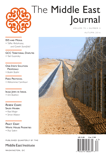
MIDDLE EAST JOURNAL
Fostering Academic Excellence in Middle Eastern DiscourseThe Middle East Journal, published by the esteemed Middle East Institute, serves as a vital platform for scholarly discourse on the complexities of the Middle East, encompassing rich analyses in the fields of Sociology, Political Science, and Geography. With a legacy dating back to 1976, this journal continues to shape contemporary dialogues, offering rigorous research and insights that influence policy-making and academic studies alike. Academic readers will note its Scopus rankings, positioning it within the lower quartiles of Geography, Planning and Development and Sociology and Political Science, reflecting an opportunity for growth and increased visibility within these fields. Although the journal is not open access, it remains an essential resource for those aiming to enhance their understanding of the historical and current dynamics of the Middle East. The Middle East Journal stands as a testament to the region's complex socio-political landscape and offers a comprehensive lens for both established scholars and aspiring researchers.

European Spatial Research and Policy
Navigating the Complexities of Spatial Policy Across EuropeEuropean Spatial Research and Policy, published by LODZ UNIV PRESS, is a distinguished Open Access academic journal that has been contributing to the field of Geography, Planning, and Development since its inception in 2009. With an ISSN of 1231-1952 and an E-ISSN of 1896-1525, this journal has established itself as a vital resource for researchers and policymakers in understanding spatial dynamics and policy implications across Europe. Recognized within the 2023 Q2 category for Geography, Planning, and Development, it ranks impressively #236 out of 821 in its category on Scopus, placing it in the 71st percentile. The journal’s aim is to foster interdisciplinary dialogue and disseminate innovative research that addresses pressing spatial challenges. Since transitioning to Open Access in 2013, it has enhanced accessibility for scholars, making its rich content readily available to a global audience. Located in Lodz, Poland, European Spatial Research and Policy is poised to continue its commitment to excellence in spatial research, offering critical insights for academics, professionals, and students alike.

China Review-An Interdisciplinary Journal on Greater China
Navigating the Intersections of Culture, Society, and Politics in Greater ChinaChina Review - An Interdisciplinary Journal on Greater China, published by Chinese University Press, is a leading scholarly platform dedicated to advancing research on the cultural, social, and political dynamics of Greater China. Since its inception in 2005, this journal has established itself as a cornerstone of interdisciplinary study, achieving a remarkable Q1 ranking in Cultural Studies with an impressive percentile of 89th in Scopus rankings. Its rich tapestry of articles serves as a vital resource for researchers, professionals, and students alike, promoting an in-depth understanding of the complexities surrounding Greater China. While currently not an open-access journal, it continues to foster academic discourse through its comprehensive analyses and innovative approaches. As the journal progresses towards its converged years ending in 2024, it remains committed to providing a forum for informed scholarly exchange that reflects the dynamic characteristics of the region.

Revista de Estudios Regionales
Fostering Insights for Regional Development.Revista de Estudios Regionales is a distinguished academic journal published by ASOC UNIV PUBLICAS ANDALUCIA-AUPA, focusing on various fundamental areas in the social sciences, including development, economics, sociology, and political science. Established in 1978 and converging its publication years to include recent contributions until 2024, the journal serves as a critical platform for international scholars and practitioners interested in the regional dynamics of Spain and beyond. Despite its current Q4 ranking in key categories such as Development, Economics, and Sociology, the journal aims to elevate discourse and foster a deeper understanding of regional studies, ultimately contributing to policy-making and academic dialogue. Accessible to readers without open-access provisions, this journal is a valuable resource for those seeking to engage with the latest theoretical and empirical research in the field. Scholars, graduate students, and policy professionals will find the journal’s insights particularly beneficial for advancing their work and understanding of regional phenomena.

JATI-Journal of Southeast Asian Studies
Bridging Cultures, Politics, and EconomiesJATI-Journal of Southeast Asian Studies is a renowned academic journal published by the University of Malaya, specifically through the Department of Southeast Asian Studies, within the Faculty of Arts & Social Sciences. This journal serves as a vital platform for researchers, scholars, and students dedicated to the comprehensive exploration of Southeast Asian cultures, politics, economics, and social dynamics. As an open access publication, JATI promotes the dissemination of knowledge to a global audience, ensuring that valuable research reaches beyond conventional academic boundaries. With its commitment to advancing interdisciplinary perspectives and providing rigorous scholarly contributions, JATI is instrumental in shaping the discourse on Southeast Asia, making it an essential resource for anyone engaged in the study or application of Southeast Asian studies.
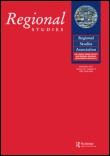
REGIONAL STUDIES
Advancing interdisciplinary insights for regional development.REGIONAL STUDIES, published by Routledge Journals, Taylor & Francis Ltd, is a premier academic journal dedicated to the exploration of regional issues, focusing on both environmental and social sciences. With an impressive impact factor that places it in the Q1 quartile for both Environmental Science and Social Sciences, this journal provides a vital platform for researchers and practitioners aiming to understand and address complex regional problems from an interdisciplinary perspective. Covering a wide range of topics relevant to regional development, policy, and dynamics, REGIONAL STUDIES has garnered recognition within the academic community, ranking #8 out of 275 in General Social Sciences and #32 out of 233 in General Environmental Science, according to Scopus. Established in 1967, the journal continues to publish high-quality research that informs both academic scholarship and practical application, making it an essential resource for anyone vested in the future of regional studies.
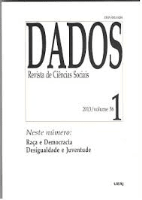
DADOS-REVISTA DE CIENCIAS SOCIAIS
Empowering Social Science Discourse GloballyDADOS-REVISTA DE CIENCIAS SOCIAIS, published by the Instituto Universitário de Pesquisas do Rio de Janeiro (IUPERJ), stands as a vital platform for scholarly discourse within the field of social sciences in Brazil. With an ISSN of 0011-5258 and an E-ISSN of 1678-4588, this journal has embraced Open Access since 1996, ensuring that its rich repository of knowledge is readily available to a global audience. Spanning an extensive timeline from 1996 to 2025, DADOS has garnered recognition in the academic community, achieving a Q3 ranking in the Social Sciences category as of 2023. With a Scopus rank of #157 out of 275 in General Social Sciences, it positions itself within the 43rd percentile, highlighting its contribution to the ever-evolving landscape of social research. Researchers, professionals, and students alike will find in DADOS a treasure trove of insightful articles and interdisciplinary studies, fostering critical engagement and informed debates in the social science arena.
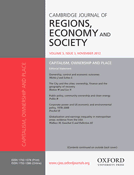
Cambridge Journal of Regions Economy and Society
Unveiling Insights into Economic and Societal InteractionsCambridge Journal of Regions Economy and Society, published by Oxford University Press, is a distinguished academic journal dedicated to the interdisciplinary exploration of regional development, economic dynamics, and societal issues. With an ISSN of 1752-1378 and an E-ISSN of 1752-1386, this journal serves as a vital platform for researchers and practitioners in the fields of economics, geography, planning, and sociology, achieving Q1 status in multiple categories, including Economics and Econometrics, Geography, Planning and Development, and Sociology and Political Science. The journal ranks impressively in the Scopus database, with percentile standings in the 90th and 96th ranges, reflecting its influence and commitment to advancing knowledge in these critical areas. Spanning from its inception in 2008 to its anticipated publications through 2024, the journal offers valuable insights and rigorous research that contribute to understanding the complexities of regional economies and societies in a global context. Although not an open access journal, it provides essential subscription options for broader academic engagement and impact.
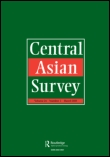
Central Asian Survey
Advancing Knowledge on Central Asia's Evolving LandscapeCentral Asian Survey is a premier academic journal published by Routledge Journals, Taylor & Francis Ltd, dedicated to advancing the understanding of the diverse social, economic, and environmental dynamics of Central Asia. With an ISSN of 0263-4937 and E-ISSN of 1465-3354, this journal serves as a vital resource for researchers, professionals, and students interested in the critical issues facing this unique region. Operating since 1982, Central Asian Survey has established itself within Q2 quartiles across multiple categories including Development, Earth-Surface Processes, and Geography, Planning and Development for 2023, reflecting its influence and quality in the field. The journal's impact is further underscored by its Scopus rankings, positioning it among the top half of journals in its categories. Although it does not currently offer open access, its rigorous peer-reviewed articles contribute significantly to scholarly discourse and policy-making. As the region continues to undergo rapid changes, Central Asian Survey remains an essential outlet for interdisciplinary collaboration and informed insights, catering to the needs of those engaged in understanding the past and shaping the future of Central Asia.